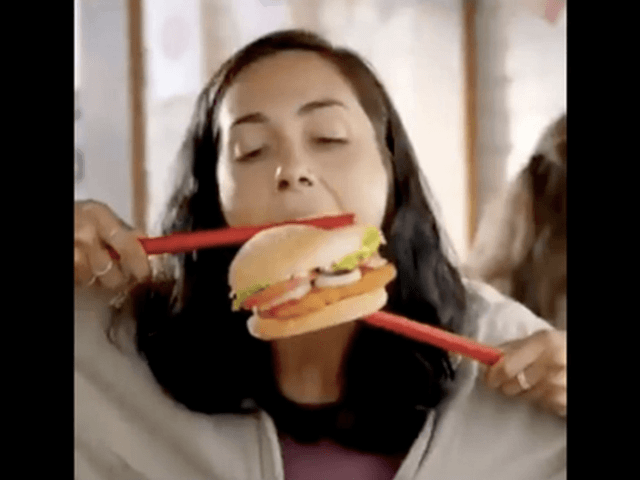The Burger King restaurant chain on Monday apologized and withdrew an advertising video that humorously depicted diners attempting to eat its new “Vietnamese Sweet Chili Tendercrisp Burger’ with chopsticks. Asian social media users slammed the ad as “racist.”
As can be seen from one of the Twitter posts criticizing it, the ad did not exclusively feature Asian diners absurdly attempting to eat the burger with chopsticks. It was designed for the New Zealand market and was only aired there.
The critics could not agree on what made the ad offensive. Some, like the example above, seemed to take offense at the implication chopsticks are clumsy and primitive, even though the implements depicted in the ad are exaggerated to comical proportions. Some argued that any form of ethnic stereotype in advertising is offensive, while others thought cultural appropriation was the problem.
Confusingly, one “backlash” message quoted by the Epoch Times proposed the ad was only offensive because it billed the burger as a “Vietnamese” dish, implying that using baton-sized chopsticks to eat a bacon double cheeseburger might be acceptable.
A backlash soon developed against the backlash, as exasperated social media users told the complainers to grow up and stop looking for flimsy excuses to cry “racism.” As is customary with social media freakout stories, no one seems terribly interested in tallying up the number of complainers and comparing it to the number of people telling them to get a life, or the number of people cheerfully eating the hamburgers without a shred of concern for social media warfare.
The outcry was loud enough for Burger King to pull the ad on Monday and apologize for running a video that was “insensitive and does not reflect our brand values regarding diversity and inclusion.”
Business Insider added to the absurdity of the situation by noting the ad was already banned in March by the New Zealand Advertising Standards Authority – not because of alleged cultural insensitivity, but because it encouraged people to overeat by telling them to devour three or four of the Vietnamese Sweet Chili Tendercrisp Burgers at a sitting. Authorities sadly overlooked the obvious solution of controlling gluttony by requiring diners to slowly consume the burgers with gigantic chopsticks.
Time puckishly noted that far more people are seeing the ad because it was transformed into a viral social media controversy than would ever have viewed it in its relatively small New Zealand target market.
BI and Time both compared the Burger King incident to last year’s Dolce & Gabbana debacle, in which the Italian fashion house depicted an Asian woman attempting to eat Italian food with chopsticks. The ad was explicitly pitched as D&G’s love letter to its treasured Asian customers and was intended to promote a major fashion show in Shanghai, but it had the opposite effect, sparking a much larger and more vicious social media backlash than Burger King endured, coupled with a boycott. The Shanghai fashion show was eventually canceled.
Time speculated the chopsticks “misstep” could cost Burger King dearly because it has major expansion plans for China and other Asian markets. Communications consultant Brent McGoldrick told Time it is increasingly common for companies to make mistakes with provocative or humorous ads meant to reach customers “distracted and inundated with content,” unleashing a flood of negative “viral dialogue” upon themselves instead of the positive buzz they desire.
Stated another way, these companies have simply underestimated the humorlessness of social media, where outrage can explode in a matter of hours and cascade into “viral” cataclysms driven by people who love being outraged.
Social media backlash is cost-free and the rush of claiming shared victimhood, castigating major corporations, and perhaps flexing enough muscle to make them cave is absolutely exhilarating for both Eastern and Western outrage addicts. The earliest and most theatrically angry respondents have a decent shot at becoming momentarily famous when big media organizations pick up the story and look for social media posts to spotlight.
Humor carries terrible risk in such an environment, where a small number of people screaming can easily drown out the gentle laughter of multitudes. Toss in the interest of governments and organized political activists in cultivating flash-mob anger to further their political agendas and humor becomes blood in shark-infested digital waters.

COMMENTS
Please let us know if you're having issues with commenting.